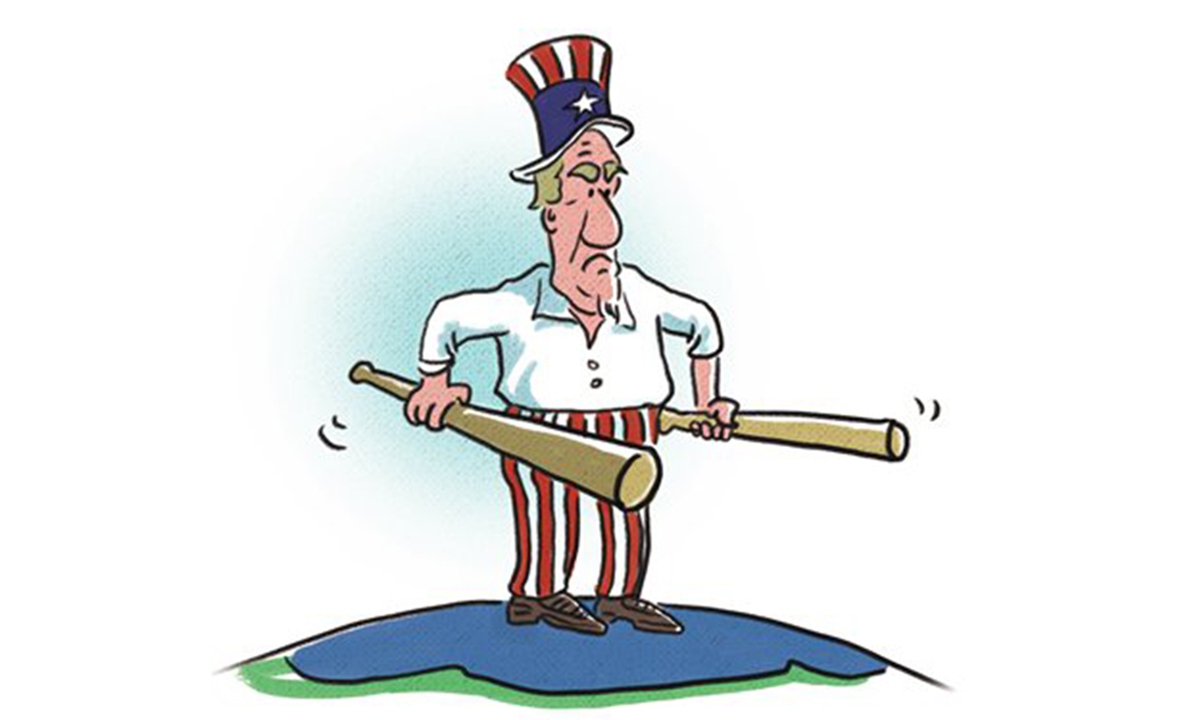The US will always bully the world's 2nd richest economy
By Su Hao Source: Global Times Published: 2020/8/20 12:03:40

Illustration: Liu Rui/GT
"If India is the second largest economy ranking the third in military power, how will the US treat India? Would the US find an excuse to contain India with Japan, China, Australia, the Philippines, and so on?" These questions have become hot topics among foreign netizens.
Many believe that the US' containment of China results from the two countries' ideological differences. According to a recent Global Times online survey, about 96 percent of Chinese respondents believe that the US' attacks on the Communist Party of China (CPC) aim to sow discord between the Chinese people and the CPC, and to launch a new cold war against China by attaching an anti-CPC ideological label to its anti-China campaign.
India, however, is regarded by the US as an influential democratic country. There are no major ideological differences between the two countries. If this is the case, how will the US react if India becomes the second largest world economy?
First, it must be made clear that it is almost impossible for India to surpass China and become the second largest economy. But for the sake of argument, if India does replace China then the US will find excuses and rope in other countries to contain India as well. This is inevitable. In other words, no matter which country becomes the second largest economy or what political system it has, Washington will regard it as a threat and contain it. But the methods of containment may be different.
Currently, Washington and New Delhi are moving closer toward each other. For example, many US politicians have publicly supported India vis-à-vis the clashes that took place in the Galwan Valley in June - even though it is India that had instigated the fracas. US Secretary of State Mike Pompeo said the clashes were the latest example of China's "unacceptable behavior."
A main reason behind the US' support is that it believes India's current national strength is not a threat. Thus, Washington has not suppressed New Delhi. Another important reason is that the US believes India can act as a handy pawn to contain China. This is in line with the US' consistent style of bullying and suppression as a superpower.
And likewise, if China, as the second largest economy, develops in accordance with the US' will of becoming a so-called Western-style democracy, will indeed Washington stop its suppressive strategies against Beijing? Definitely not. The US' suppression does not have much to do with China's political system. The US has always advocated its own power. This is especially true for the incumbent president's administration. Bullying and sabotage are par for the course. While many Eastern countries attach importance to morality and justice, most Western countries including the US do not.
The US' internal challenges lie behind its tactics to take China down. As our civilization progresses, weak elements of Western governance have revealed themselves. The respective response of China and the US to the COVID-19 crisis is a glaring example of this.
China's COVID-19 fight has reflected its systematic advantages. Meanwhile, the US decline has nothing to do with China's rise and success. The US can't suppress the world's second largest economy, as the flaws in its system are laid bare. The decline of the US is inevitable.
The author is founding director of the Center for Strategic and Peace Studies at the China Foreign Affairs University. opinion@globaltimes.com.cn
Posted in: VIEWPOINT,CHINA-US